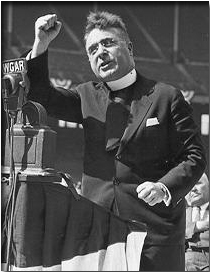It was the age of demagoguery in American politics. And, no, it wasn’t the 2016 Republican Party primaries and caucuses. It was the year 1938.
In an age-before-Trump, you need only to look back to the 1930s and the Canadian-born “Radio Priest” Father Charles Coughlin, from Hamilton, Ontario, later based at Royal Oak, Michigan in the Archdiocese of Detroit, and the anti-Communist and equally anti-Semitic Christian Front he would be the inspiration for in November 1938, although he didn’t personally belong to the organization, and denied that he was anti-Semitic. Historical opinion is divided on whether, or to what extent, Coughlin was anti-Semitic, but it is an uncontested fact his weekly magazine Social Justice reprinted in weekly installments in 1938 the fraudulent and notoriously anti-Semitic text, The Protocols of the Elders of Zion, a Russian forgery first published in 1903 that purports to expose a Jewish conspiracy to seize control of the world.
Coughlin’s radio show was phenomenally popular. His office received up to 80,000 letters per week from listeners at its peak in the early to mid-1930s. By 1934, Coughlin was the most prominent Roman Catholic speaker on political and financial issues in the United States, with a far broader base of popular support than any bishop or cardinal at the time, with a radio audience that reached tens of millions of people every week. Historian Alan Brinkley wrote in his 1982 book Voices of Protest: Huey Long, Father Coughlin, and the Great Depression that by 1934 Coughlin was receiving more than 10,000 letters every day” and that “his clerical staff at times numbered more than a hundred.” Coughlin foreshadowed modern talk radio and televangelism.
In addition to his anti-Communist stance, and leaving himself open rightly or wrongly to accusations of antisemitism, Coughlin wasn’t the only clergyman to at least also flirt and even dance at times with Spanish fascism, German National Socialism and demagoguery in the United States in the late 1930s. American Protestant clergyman Frank Buchman founded Moral Re-Armament (MRA) in 1938, as an international moral and spiritual movement with Europe rearming militarily on the brink of the Second World War. “The crisis is fundamentally a moral one,” he said. “The nations must rearm morally,” Buchman said in London on May 29, 1938. “Moral recovery is essentially the forerunner of economic recovery. Moral recovery creates not crisis but confidence and unity in every phase of life.”
Buchman had earlier also founded the Oxford Group, in some important ways the predecessor to Alcoholics Anonymous (AA). Both the Oxford Group and Moral Re-Armament, under Buchman’s leadership, faced similar charges to what Coughlin did at times; and again, like in the case of Coughlin, historical opinion is divided, but on the evidence it is clear the German Nazi leadership was wary of Buchman and denounced Moral Re-Armament, which went onto do significant post-war reconstruction work in West Germany in the late 1940s, after the Second World War ended.
We barely know their names today, yet Coughlin had tens of millions of radio listeners in the United States, while Buchman influenced political elites worldwide.
And the legacy of Moral Re-Armament, close to home here in Northern Manitoba, is not insignificant. Just largely invisible.
Roman Catholic Archdiocese of Keewatin-Le Pas Archbishop emeritus Sylvain Lavoie, whose archdiocese includes Thompson, toured during university for seven months with “Up with People,” founded by American J. Blanton Belk in 1965, as a conservative counterweight to attract young people during the turbulent Sixties.
Belk was expected to be the heir apparent to Peter D. Howard, a British journalist, who succeeded Buchman as leader of Moral Re-Armament in 1961, but Belk broke away to incorporate Up With People as a non-profit at the encouragement of then Republican U.S. president Dwight Eisenhower, who urged Belk to distance himself from Moral Re-Armament.
And Winnipeg-born Bob Lowery, for years the Winnipeg Free Press’ Thompson-based correspondent, in a life before journalism and living in Northern Manitoba, and immediately after the Second World War ended in 1945, had joined the Moral Re-Armament crusade to help rebuild war-torn Germany, staying there for more than 20 years until 1969.
During the Second World War he had served with the Royal Canadian Voluntary Reserve. Lowery had earned a philosophy undergraduate degree from the University of Manitoba in 1937.
Robert Newton Lowery was inducted by then governor general Roméo LeBlanc as a Member of the Order of Canada in 1996. In the citation accompanying the honour, LeBlanc noted Lowery was “known for his love of the North and has demonstrated genuine concern for the residents of northern Manitoba, working to redress social, economic and cultural differences through his involvement in all aspects of community life.”
In 1997 he was recognized with a Silver Eagle Outstanding Citizen Award from the Indigenous Women’s Collective of Manitoba. A park is also named after him here in Thompson.
He had moved to northern Manitoba in 1969, the same year he left Moral Re-Armament in West Germany, and become a correspondent for the Winnipeg Free Press, based here in Thompson.
In 1982 Lowery published the book The Unbeatable Breed: People and Events of Northern Manitoba in collaboration with photographer Murray McKenzie.
Lowery retired in 1997. He died at Norway House on Dec. 17, 2000.
You can also follow me on Twitter at: https://twitter.com/jwbarker22





